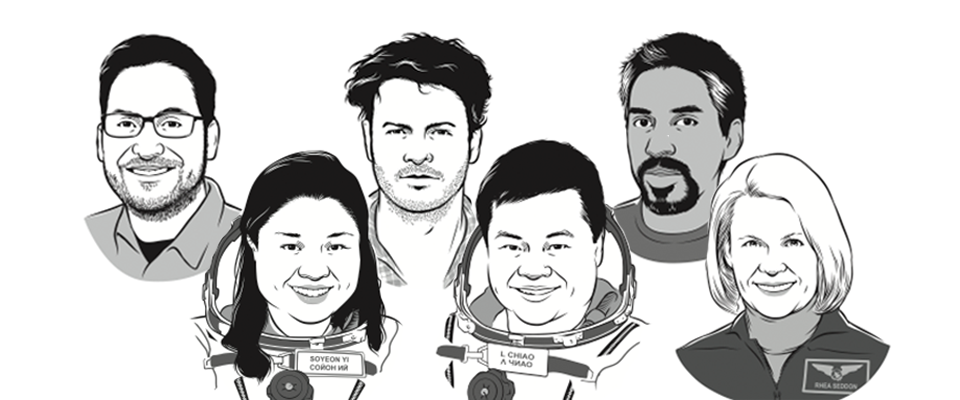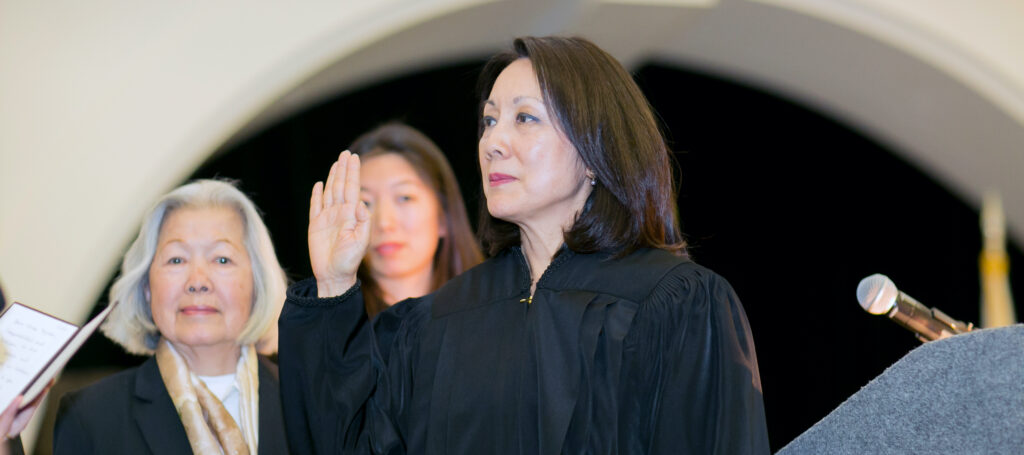From Berkeley to the beyond, these grads have really taken off.
Margaret Rhea Seddon

Margaret Rhea Seddon ’70 came to Cal in 1965 from Murfreesboro, Tennessee. It was an eye-opening, and liberating, experience for the Southern belle. As she recalls in her 2016 memoir, Go for Orbit: “While students at traditional colleges worried about the football team and dates, I worried about throat-burning tear gas raining down from police helicopters or rounding a corner on campus to come face-to-face with National Guard troops in riot gear. Amidst the turmoil, however, new ways of thinking were developing. It was becoming more acceptable for women to plan careers, even unconventional ones.” For her part, Rhea Seddon went on to become an ER doctor, then an astronaut—part of the same NASA class as Sally Ride. As a veteran of three space shuttle missions, Seddon has orbited Earth nearly 500 times.
Leroy Chiao

The International Space Station (ISS) has been circling Earth for nearly 21 years, but Leroy Chiao ’83, veteran of three space shuttle missions and former commander of the ISS, still remembers when, as he told the New York Times Magazine last year, “it had that new car smell.” Chiao, who retired from NASA in 2005, now heads up a speakers bureau called OneOrbit, makes regular media appearances, and tweets under the handle @AstroDude. Chiao, who also speaks Mandarin, learned Russian in order to communicate with the cosmonauts with whom he lived aboard the space station for several months. In 2019, he participated in an Oxford Union debate, arguing for the motion,“The Future Is In Space.” Chiao insisted that eliminating space flight programs would not only be detrimental, but would also plunge the world into a “death spiral.”
Jason Achilles Mezilis

Ever wondered what it sounds like on Mars? Jason Achilles Mezilis ’96 is with you. The L.A. rock musician/producer designed and built a microphone for NASA’s Perseverance Rover, made to withstand the harsh conditions of our planetary cousin. After the rover touched down in February, Mezilis’s microphone recorded the sound of gusting wind on the Red Planet and beamed the audio file back to Earth. When it comes to the music scene, Mezili has done it all—performing, producing, and recording under the name Jason Achilles. Designing this microphone was an unlikely odyssey for Mezilis, one that grew out of his friendship with a Jet Propulsion Laboratory engineer and which turned him into what Wired magazine called “a bona fide extraterrestrial audio engineer (a space roadie, if you like).”
Asad Aboobaker

Asad Aboobaker ’00 has moxie. Or, at least, he’s working on bringing it to Mars. MOXIE, which stands for Mars Oxygen In-Situ Resource Utilization Experiment, has a simple goal: take the atmospheric carbon dioxide of Mars and turn it into oxygen, the eventual source material for rocket fuel and, of course, astronaut-breathable air. Aboobaker, an instrument systems engineer for NASA’s Jet Propulsion Laboratory since 2014, graduated from Berkeley with bachelor’s degrees in physics and astrophysics before getting his doctorate in physics at Princeton. In his NASA bio, Aboobaker hints at the roots of his love for all things interstellar: “If you find yourself staring in awe at a star-filled night sky or marveling at rocket launch videos, you might be a space nerd like me.”
Steve Barajas

Steve Barajas ’10, a mechanical engineer at NASA’s Jet Propulsion Laboratory, spearheaded construction of the Perseverance test model and played a key role in the design of the Mars rover’s chassis. After designs of the test model proved themselves satisfactory, Barajas hopped aboard the Assembly, Test, and Launch Operations Mechanical team, following the actual Perseverance Rover through further shakedowns (e.g., spin tests, shake tests, and various other trials), until it was ready to face the harsh conditions of the final frontier. What triggered Barajas’s space enthusiasm? A book about space his parents gave him in third grade. He pored over it, falling in love with the stars and their planets. Now, he’s part of that story.
Soyeon Yi

The first Korean in space, Soyeon Yi, MBA ’14, came to Cal in 2010, after her stint aboard the ISS in 2008. Yi, who also has a doctorate in biotechnology from the Korea Advanced Institute of Science and Technology, carried 1,000 fruit flies aboard the Soyuz rocket that ferried her to the ISS and proceeded to observe the effects of space on the flies’ behavior and genome. On Yi’s return to Earth her space capsule malfunctioned, landing some 300 miles off target, in a remote part of Kazakhstan, startling local inhabitants. “The nomads were surprised when Yuri [Malenchenko, the Russian flight engineer] climbed out of the capsule,” Yi told Korean television. “They very well would have been, since a ball of fire fell from the sky and then a white object crawled out of it.”
From the Summer 2021 issue of California.




















